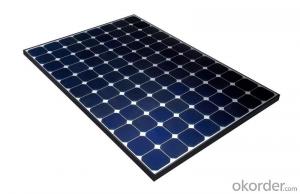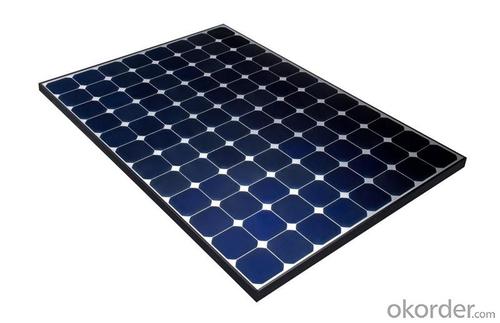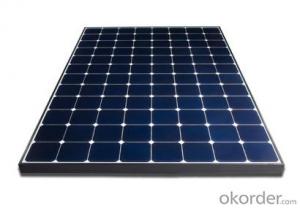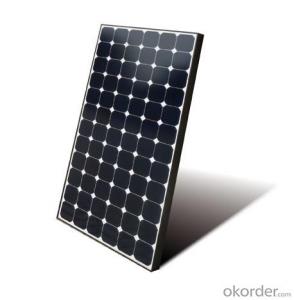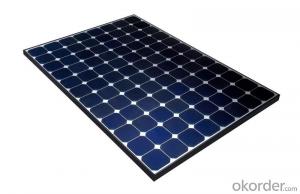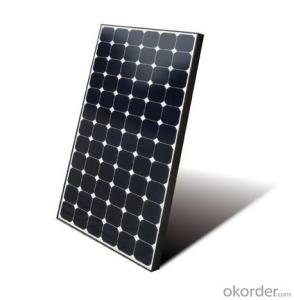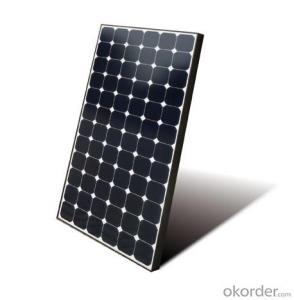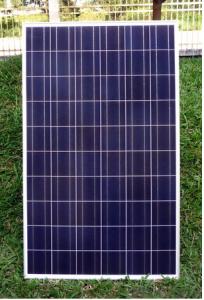Solara Solar Panels - CNBM Poly 185W Solar Panel with TUV UL CE Certificate for Residential
- Loading Port:
- Shanghai
- Payment Terms:
- TT OR LC
- Min Order Qty:
- 500 watt
- Supply Capability:
- 1000 watt/month
OKorder Service Pledge
OKorder Financial Service
You Might Also Like
Specification
CNBM Poly 185W Solar Panel with TUV UL CE Certificate For Residential
Introduction
Electrical connections are made in series to achieve a desired output voltage and/or in parallel to provide a desired current capability. The conducting wires that take the current off the modules may contain silver, copper or other non-magnetic conductive [transition metals]. The cells must be connected electrically to one another and to the rest of the system. Externally, popular terrestrial usage photovoltaic modules use MC3 (older) or MC4 connectors to facilitate easy weatherproof connections to the rest of the system.
Each module is rated by its DC output power under standard test conditions, and typically ranges from 100 to 365 watts. The efficiency of a module determines the area of a module given the same rated output – an 8% efficient 230 watt module will have twice the area of a 16% efficient 230 watt module. There are a few solar panels available that are exceeding 19% efficiency. A single solar module can produce only a limited amount of power; most installations contain multiple modules. A photovoltaic system typically includes a panel or an array of solar modules, a solar inverter, and sometimes a battery and/or solar tracker and interconnection wiring.
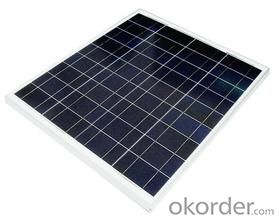
Suggested application
Home lighting business lighting,
Garden lighting, pavement lighting
Farmer household lighting
Decorative water pump
Traffic signal lighting
Industry area
Business area
Solar Power Plant
Product feature
Modules are made of Monocrystalline or Polycrystalline Silicon cell.
Materials and color of the solar panel frame: Clear anodized aluminum alloy type 6063T5 Universal frame; Silver-white color;
The output connection gathers the coupling: Selects conforms to the IEC-612615; 2005, class II, IEC61730 international standard; Airtight waterproofing binding clamp;
Module seal structure: The surface is thick, the high diaphanous rate armored glass with solar cell board special-purpose 3.2mm becomes after the high temperature lamination craft. The back selects has waterproof and anti- aged performance fine TPT materials. The entire block battery board has, the waterproofing, the anti- aging airtight and so on the fine performance;
Power tolerance: +/-3%
Packaging
International standard cartons (according to the requirements of customers)
- Q: I'm trying to charge rechargeable AA batteries with a solar panel. What guage wire should I use to connect the panel to the batteries? Should I use a diode to keep the batteries from overpowering the circuit? If so, what size? My panel is 4.8V 50mA.
- With that size panel, you should be able to recharge either AA battery, or two AA batteries in series. Yes, it would be a good idea to put a blocking diode in series with the panel - anything will do, like a N448. You will want to use NiCd batteries if possible, because they take a trickle charge of 50 mA much better than NiMH (which prefers pulse charging, a more complicated circuit). You can use NiMH if you must. Needless to say, don't try to charge non-rechargable batteries. Also realize that at this charge rate, it will take days, maybe even a week, to charge the batteries, if left out in full sun all day long.
- Q: I want to make 2V 4.5A solar panel to charge my battery used in my RC car project. I just like to know how should I amplify the current for 4.5A. I need the total circuit diagram. Can anyone help me. Please. I need some affordable methods please.
- To increase current, you connect the cells in parallel. But I think you really mean you need 4.5 watts rather than 4.5 amps of current. For an RC car, 4.5 amps would be huge, literally a regular car battery. So I think you mean you need a 2v, 4.5w panel. That would make more sense for an RC car battery. I went on OKorder and bought a 2v, 5 watt panel for about $30.
- Q: Can solar panels be used to power an air conditioning system?
- Yes, solar panels can be used to power an air conditioning system. Solar energy can be converted into electricity, which can then be used to power various appliances including air conditioning units. By harnessing the power of the sun, solar panels can provide a sustainable and cost-effective solution for cooling homes and buildings.
- Q: I'm curious, for those who have had solar panels installed on the rooves of their houses:How much did you pay? How much energy do the panels produce? Did it dramatically cut down on your electricity bill? Was it worth it? Thanks!
- I say yes, I had a system put in a few months ago. I paid $6K and my utility paid $0K. I should break even in about 6 years. The system is guaranteed for 25 years, so I will have at least 9 years of free energy. I went from a bill of around $200 per month to under $20 in the summer. I will pay a little more in the winter months because less daylight, but I don't use as much energy in the winter. Each year electricity goes up an average of 5%, so while my neighbors have a larger bill each month, I'll be staying under $50 for a long time. Even without the rebate I would have a break even time of about 0 years, still 5 years of free energy.
- Q: Do solar panels require regular cleaning?
- Yes, solar panels do require regular cleaning to maintain optimal performance. Accumulation of dust, dirt, leaves, bird droppings, and other debris can reduce the efficiency of the panels. Regular cleaning, either by homeowners or professional services, helps ensure maximum sunlight absorption and energy production.
- Q: How do solar panels affect the insurance premiums of a home?
- Solar panels can potentially affect the insurance premiums of a home in a positive way. While the upfront cost of installing solar panels may increase the overall value of the property, insurance companies often view solar panels as a risk-reducing feature. This is because they can decrease the home's reliance on traditional energy sources and potentially lower the risk of fire or electrical damage. As a result, homeowners may be eligible for certain insurance discounts or reduced premiums, depending on the insurance provider and policy.
- Q: Can solar panels be installed on warehouses?
- Yes, solar panels can be installed on warehouses. In fact, warehouses are ideal locations for solar panel installations due to their large roof spaces and minimal shade obstruction, allowing for maximum exposure to sunlight and optimal energy generation.
- Q: i am very new to the solar world and i need help with some stuff to understand what i need to do.what AH battery should i use? i am planning on getting a 2V deep cycle gel based battery but i want to get the most power for my system so should i use something like a few 00AH in a battery bank system or a bunch or 50 or so amp hour batteries in a bank. also what kind of power am i looking at for the best battery system. in other words what kind of basic appliances like lighting, laptop,space heaters etc can can i run on the selected battery system and for how long? any help would be highly appreciated.
- I'm sure that you might discover everything concerning solar power at www.okorder .
- Q: Can solar panels be used in areas with high levels of noise or vibration?
- Yes, solar panels can be used in areas with high levels of noise or vibration. Solar panels are designed to be durable and can withstand moderate levels of vibration without being damaged. However, excessive noise or vibration can potentially affect their performance and efficiency. Therefore, it is recommended to assess the specific conditions and consult with a solar panel expert to ensure optimal installation and functioning in such areas.
- Q: okay so my teacher is trying to install a solar panel but we have a problem we don't know where to ground it because it will be a movil house. guys do you have any ideas?
- Typically you mount it with the frame as a ground and you ground the frame with a wire or cable tied into the ground when the mobile home is parked.
Send your message to us
Solara Solar Panels - CNBM Poly 185W Solar Panel with TUV UL CE Certificate for Residential
- Loading Port:
- Shanghai
- Payment Terms:
- TT OR LC
- Min Order Qty:
- 500 watt
- Supply Capability:
- 1000 watt/month
OKorder Service Pledge
OKorder Financial Service
Similar products
Hot products
Hot Searches
Related keywords
